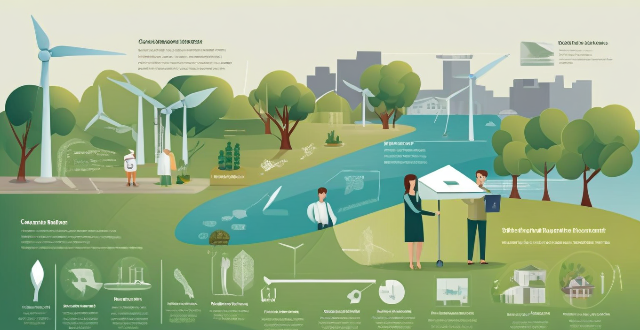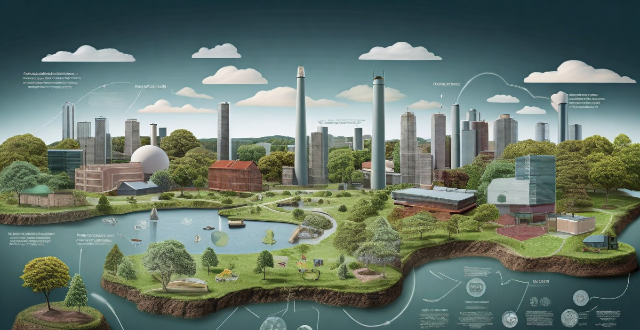Environmental Change

How do climate change lawsuits against corporations influence environmental policy ?
Climate change lawsuits against corporations are a tool in the fight against environmental degradation. They raise awareness, force corporate responsibility, influence government policies, promote sustainable practices, and encourage legal action. These lawsuits contribute to a more sustainable future by holding corporations accountable for their role in contributing to climate change.

What is the relationship between climate change, environmental degradation, and population movements ?
The text discusses the interconnectedness of climate change, environmental degradation, and population movements. It explains how these factors influence each other and their potential impacts on society and the environment. Climate change directly affects the environment through rising sea levels, extreme weather events, and habitat loss. Environmental degradation contributes to climate change through deforestation and soil erosion. Population movements are influenced by climate change through displacement, resource scarcity, and health risks, while environmental degradation leads to loss of livelihoods, pollution, and habitat loss. The relationship between these issues is complex and requires integrated approaches to conservation and sustainability efforts.

How do low-income countries deal with issues related to climate change and environmental degradation ?
Low-income countries face challenges in addressing climate change and environmental degradation. They focus on building resilience through early warning systems, disaster risk reduction, infrastructure development, and resilient agricultural practices. Community-based approaches involve local communities in decision-making, capacity building, participatory planning, and integrating traditional knowledge. Mitigation efforts include investing in renewable energy, promoting energy efficiency, and implementing sustainable forestry practices. International cooperation involves financial assistance, technology transfer, and capacity building support. Policy frameworks guide actions on climate change and environmental protection through national policies, legislative measures, and public awareness campaigns.

What is the role of individuals in addressing climate change and environmental degradation ?
This article discusses the role of individuals in combating climate change and environmental degradation. It highlights the cumulative impact of individual actions, their potential to inspire others, and the political pressure they can exert. The article provides practical steps individuals can take, such as reducing their carbon footprint, supporting renewable energy, waste reduction and recycling, advocating for environmental policies, and spreading awareness. It emphasizes that collective efforts can make a significant difference in creating a more sustainable future for our planet.

How do economic systems contribute to environmental problems and climate change ?
Economic systems, especially capitalism and industrialization, significantly impact the environment by promoting overproduction, waste, and reliance on fossil fuels. Issues such as built-in obsolescence, global trade emissions, and exploitation of natural resources exacerbate environmental problems. Additionally, population growth and urbanization increase consumption, while market failures and regulatory gaps often overlook environmental costs. Addressing these challenges requires a shift in economic priorities towards sustainability.

How does climate change legislation address the concerns of environmental justice and equity ?
Climate change legislation should address environmental justice and equity by prioritizing vulnerable communities, promoting participatory decision-making, ensuring access to clean energy and sustainable practices, and addressing environmental health disparities. This will create more equitable and effective climate policies for all communities.

What is the impact of climate change on environmental consciousness ?
Climate change has significantly influenced environmental consciousness, leading to increased awareness, changes in behavior, community action, and a deeper sense of empathy and ethics. This shift is evident in individual lifestyle choices, policy influences, grassroots movements, and global collaborations, all aimed at mitigating the impacts of climate change and fostering a more sustainable future.

How do people's attitudes towards climate change affect their willingness to take action on environmental issues ?
The text discusses how attitudes towards climate change influence environmental action. It identifies factors like awareness, emotional connection, responsibility, barriers, and incentives that shape willingness to act on environmental issues.

How does climate change affect the priorities in environmental monitoring ?
Climate change significantly impacts the priorities in environmental monitoring by necessitating a focus on rising sea levels, extreme weather events, changes in biodiversity, impacts on agriculture and food security, and air quality issues. Addressing these challenges requires a comprehensive approach that incorporates regular monitoring, early warning systems, adaptation strategies, and effective conservation planning.

What is the role of education in addressing climate change ?
Education is pivotal in addressing climate change by empowering individuals with knowledge, skills, and attitudes necessary to understand and combat the issue. It cultivates a culture of sustainability and resilience, preparing future generations to face the challenges posed by a changing climate. Education raises awareness about the science behind climate change, promotes environmental literacy, and fosters a fundamental understanding of the complex interactions between human activities and the environment. By integrating climate change into school curricula and higher education programs, students learn about the importance of biodiversity, renewable energy sources, and sustainable practices, equipping them with the tools to make informed decisions and adopt eco-friendly behaviors. Education encourages critical thinking and problem-solving skills, which are essential for finding innovative solutions to mitigate and adapt to climate change. Students are encouraged to engage in projects and research that promote sustainability and environmental conservation. Education can inspire a sense of responsibility towards the environment, encouraging individuals to take active roles in protecting it. This can lead to community-based initiatives, such as tree planting, waste reduction campaigns, and advocacy for environmental policies. Educated citizens are better equipped to participate in democratic processes, ensuring that climate change is addressed through effective policies and regulations. They can hold governments and corporations accountable for their environmental impacts and push for systemic changes. Education is vital for developing a green economy by creating jobs in renewable energy, sustainable agriculture, and other environmental sectors. It prepares the workforce for industries of the future, where sustainability is a core value. Education promotes cross-cultural understanding and cooperation, which is essential for addressing a global issue like climate change. International exchange programs and collaborations can share best practices and technologies across borders. Education is crucial for building the capacity of communities disproportionately affected by climate change, enabling them to adapt and thrive despite adverse conditions. It ensures that everyone has access to information and resources needed to cope with climate-related challenges. In conclusion, education is a powerful tool in the fight against climate change, informing and empowering individuals to become agents of change.

How has environmental legislation evolved over time ?
Environmental legislation has evolved over time, reflecting growing awareness of environmental issues. Early stages focused on preserving natural resources and conserving wildlife habitats, while post-World War II saw a shift towards pollution control through air and water quality regulations. The late 20th century introduced comprehensive environmental protection laws addressing multiple aspects of environmental degradation. Today's legislation prioritizes sustainable development and climate change mitigation, with a focus on public participation and transparency in decision-making processes.

Have any celebrities started their own environmental organizations or foundations ?
This text discusses the environmental organizations and foundations founded by celebrities such as Leonardo DiCaprio, Emma Watson, Prince Harry and Meghan Markle, and Jane Goodall. The organizations focus on various environmental causes, including protecting wildlife, combating climate change, promoting sustainability, and addressing social justice issues related to the environment.

What are the ethical responsibilities of governments in mitigating climate change ?
The text discusses the ethical responsibilities of governments in mitigating climate change, which include protecting public health and safety, promoting intergenerational equity, upholding international agreements, ensuring transparency and accountability, and promoting environmental justice. Governments must take proactive measures to reduce greenhouse gas emissions and implement adaptation strategies to minimize risks to public health. They have an obligation to ensure that current generations do not compromise the well-being of future generations by neglecting climate change. Upholding international agreements such as the Paris Agreement is an ethical responsibility of governments, as it demonstrates a commitment to collective action and cooperation in addressing a shared global challenge. Governments must be transparent and accountable in their actions related to climate change, disclosing information about greenhouse gas emissions and engaging with civil society organizations and the public on climate change issues. Environmental justice refers to the fair treatment of people regardless of race, ethnicity, income, or geographical location, with respect to environmental hazards and benefits. Governments have an ethical responsibility to address disparities in exposure to environmental harms caused by climate change.

Can environmental legislation effectively reduce pollution ?
Environmental legislation has the potential to effectively reduce pollution, but its success depends on various factors such as enforcement and compliance, public awareness and participation, technological innovation, political will, international cooperation, and economic considerations. Strong regulatory bodies, education campaigns, investment in clean technology, government prioritization of environmental protection, global collaboration, and balancing environmental goals with economic development are all crucial for the effectiveness of environmental legislation. Achieving lasting improvements in environmental quality requires ongoing effort from all sectors of society.

How do ESG (Environmental, Social, and Governance) criteria factor into investment strategies regarding climate change ?
ESG criteria are becoming increasingly important in investment strategies regarding climate change. Environmental criteria include renewable energy sources, emissions reduction, and sustainable sourcing. Social criteria include workforce development, community engagement, and human rights. Governance criteria include board diversity, transparency and accountability, and long-term planning. By prioritizing these criteria, investors can help drive positive change while mitigating financial risks associated with climate change.

Can you explain the importance of continuous environmental monitoring ?
The article emphasizes the importance of continuous environmental monitoring, which involves regularly collecting data on various environmental factors such as air and water quality, soil conditions, and biodiversity. It helps identify potential issues early on, track long-term changes, support conservation efforts, enhance public awareness, and facilitate research and innovation. The author encourages everyone to stay informed about the state of their local environment and take action to protect it.

What is the concept of "green investing" and how does it relate to climate change ?
Green investing is a concept that involves directing financial resources towards companies, projects, or funds that prioritize environmental sustainability and social responsibility. It is an approach to investing that takes into account the environmental impact of investments, with the goal of promoting sustainable development and reducing the negative effects of climate change. The concept of green investing is closely related to climate change as it aims to address the environmental challenges caused by human activities. By investing in companies and projects that prioritize sustainability, green investors can help reduce carbon emissions, conserve natural resources, and promote renewable energy sources. This, in turn, can contribute to mitigating the effects of climate change and creating a more sustainable future.

How does climate change affect social structures and relationships ?
The impact of climate change extends beyond environmental changes to significantly affect social structures and human relationships. This includes alterations in living conditions such as resource scarcity and habitat loss, economic disruptions like job market fluctuations and industry adaptations, increased social stress and migration, health implications including direct effects and mental health considerations, political and governance challenges involving policy implementation and legal frameworks, and cultural shifts towards environmental consciousness and education. These transformations necessitate societal adaptation and evolution to confront the multifaceted challenges posed by a changing climate.

How can climate and environmental policies be adapted to address the challenges posed by climate change ?
To address the challenges posed by climate change, climate and environmental policies must be adapted to ensure they are robust, flexible, and capable of meeting the evolving needs of our planet. This can be done by setting clear and ambitious targets for reducing greenhouse gas emissions and developing strategies for adapting to the impacts of climate change that cannot be avoided. Promoting renewable energy sources, improving energy efficiency, investing in research and development, encouraging sustainable land use, strengthening international cooperation, educating the public and raising awareness, establishing carbon pricing mechanisms, and preparing for climate-related risks are also key steps. By adopting these measures, we can work together towards a sustainable future.

How does environmental degradation affect global ecosystems ?
Environmental degradation affects global ecosystems in various ways, including loss of biodiversity, disruption of ecosystem services, changes in the carbon cycle, and impact on human health. It is crucial to take steps to mitigate environmental degradation and protect our planet's ecosystems for future generations.

What is the role of education in promoting environmental awareness and action ?
Education plays a crucial role in promoting environmental awareness and action by providing knowledge about the environment, developing environmental values, encouraging active engagement, teaching problem-solving skills, and providing opportunities for leadership development.

How does education contribute to raising environmental awareness among future generations ?
Education is crucial for raising environmental awareness among future generations, as it enhances knowledge, develops values, and promotes action. Incorporating environmental education into the curriculum empowers students with the necessary tools to understand and address complex challenges facing our planet. By fostering a deeper appreciation for nature and cultivating a sense of responsibility towards preserving it, schools can play a significant role in nurturing eco-conscious citizens who are well-equipped to confront and overcome environmental challenges.

How do environmental subsidy policies influence consumer behavior ?
Environmental subsidy policies aim to promote sustainable practices and reduce environmental harm by offering financial incentives. These policies can encourage green consumption, lower the cost of eco-friendly products, and raise awareness about environmental issues. However, they also face challenges such as insufficient incentives, unintended consequences, and limited scope and impact. Therefore, careful design and evaluation are crucial for ensuring their effectiveness in promoting sustainable development.

How does environmental stress from climate change influence mental health disorders such as anxiety and depression ?
Climate change is a global issue that not only affects the environment but also has significant implications for human health, including mental health. Environmental stress from climate change can exacerbate existing mental health disorders such as anxiety and depression or even trigger new ones. One of the most direct ways in which climate change impacts mental health is through increased exposure to natural disasters such as hurricanes, floods, wildfires, and heatwaves. These events can cause traumatic experiences, loss of homes and communities, displacement, and financial hardship, all of which are risk factors for developing mental health disorders like anxiety and depression. Climate change affects ecosystem services, such as air and water quality, food production, and outdoor recreational opportunities, all of which have been linked to mental well-being. The socioeconomic impacts of climate change, such as job loss in industries affected by climate policies or extreme weather events, can lead to financial insecurity and social disruptions that exacerbate mental health conditions. Anticipatory anxiety about the potential consequences of climate change can also contribute to chronic stress and exacerbate anxiety and depressive symptoms. Coping mechanisms and building resilience are essential for managing the psychological impacts of environmental stress.

What are some popular celebrity-led environmental initiatives ?
Celebrities have a significant influence on society and many of them use their platform to promote environmental causes. Here are some popular celebrity-led environmental initiatives: Leonardo DiCaprio's Earth Alliance supports indigenous peoples and communities in protecting their lands and resources. The organization focuses on funding grassroots organizations that work to protect biodiversity and combat climate change. Ellen DeGeneres has worked with the Natural Resources Defense Council (NRDC) to raise awareness about conservation and sustainability. The NRDC is one of the most influential environmental advocacy groups in the world, working on issues such as clean energy, oceans, wildlife, and more. Actress Shailene Woodley has been involved with Greenpeace, an international nonprofit organization that focuses on environmental issues such as climate change, deforestation, and overfishing. Woodley has participated in protests and campaigns to raise awareness about these issues. Musician Pharrell Williams collaborated with G-Star RAW to create Bionic Yarn, a fabric made from recycled ocean plastic. The project aims to reduce waste by transforming it into something useful while also raising awareness about ocean pollution. Emma Watson launched The Environment Age, a website dedicated to sharing information about environmental issues and inspiring readers to take action. The site covers topics such as climate change, pollution, animal welfare, and more.

How does climate justice relate to environmental racism ?
This text discusses the interconnected reality of climate justice and environmental racism. It defines both terms, outlines their intersection in terms of historical and structural inequities, disproportionate impacts, mitigation and adaptation inequities, and exclusion from decision-making processes. It then proposes solutions to address this intersection, including promoting participatory democracy, equitable allocation of resources, enforcing environmental justice legislation, and building resilience through education and capacity building. Overall, it emphasizes the need for a more equitable approach to environmental protection and climate action that recognizes and challenges the root causes and impacts of environmental racism within the broader context of climate justice.

What are the economic costs of environmental degradation ?
The text discusses the economic costs of environmental degradation, which include both direct and indirect costs. Direct costs are easily quantifiable and include resource depletion, health impacts, agricultural losses, and infrastructure damage. Indirect costs are more difficult to quantify but still have significant economic impacts, such as lost biodiversity, reduced quality of life, social unrest, and climate change mitigation costs. The text emphasizes the importance of addressing environmental issues for long-term economic stability and growth.

How can environmental ethics help address climate change ?
Environmental ethics, a branch of philosophy, examines the moral relationship between humans and nature. It helps in addressing climate change by recognizing nature's intrinsic value, promoting stewardship and sustainability, encouraging intergenerational equity, and fostering global cooperation.

How does international environmental law address global warming ?
International environmental law plays a crucial role in addressing global warming by setting standards, encouraging cooperation, and promoting sustainable practices through treaties, agreements, and principles. The Framework Convention on Climate Change (UNFCCC), the Kyoto Protocol, and the Paris Agreement are key legal instruments that establish targets for reducing greenhouse gas emissions and provide mechanisms for compliance and financial support. Other initiatives such as Regional Seas Programmes, the Convention on Biological Diversity (CBD), and Forest Law Enforcement, Governance and Trade (FLEGT) also contribute to mitigating climate change. Challenges include enforcement, political will, and ensuring equity and justice in actions taken. As the fight against global warming continues, international environmental law must adapt to evolving scientific, political, and technological landscapes, requiring collaboration and innovation among nations.

What are the most effective ways to promote environmental awareness ?
Promoting environmental awareness is crucial for the sustainable development of our planet. Effective ways to raise awareness about environmental issues include education and training through school curriculums, community workshops, and online courses; media and public outreach via social media campaigns, public service announcements, and documentaries; corporate responsibility initiatives such as green marketing, CSR programs, and partnerships with NGOs; and government policies and initiatives including environmental legislation, eco-friendly infrastructure, and international cooperation. By implementing these strategies, we can create a more informed and engaged global community committed to protecting our environment for future generations.